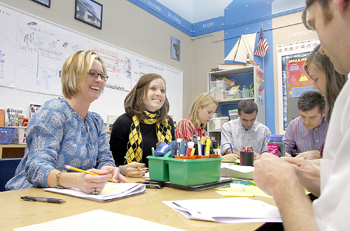To keep math and science teachers from leaving the classroom for higher-paying jobs, Georgia officials now are giving them extra pay.
An incentive program approved by lawmakers in 2009 but funded now for the first time gives teachers who have taught middle and high school math and science for five years or less the same the salary as a sixth-year teacher.
The teachers will continue at that level of pay until their seventh year teaching, officials said.
The program, which does not include extra money for teachers with more than five years of experience, will cost the state $12.6 million.
Officials with the state's two teachers' unions say it's a good idea to pay teachers more, but that the move could have unintended consequences.
"You'll start the year with teachers who are on step five who were hired a year ago, and some people who are on that level who have been there five years. That could create some friction," said Tim Callahan, spokesman for the Professional Association of Georgia Educators.
Pay incentives shouldn't be only for those who teach the two subjects, he said.
"Who's to say a reading teacher isn't more valuable than a math teacher?" he asked. "If you don't learn to read your math textbook, for example, you won't be very good in math."
State Rep. Brooks Coleman, R-Duluth, chairman of the House Education Committee and sponsor of the 2009 bill, did not return a phone call seeking comment.
Jill Day, a physical science teacher at LaFayette Middle School, came to teaching after eight years as a chemist. She has taught for six years, so she won't receive a pay incentive, but she thinks the concept is a good one. Math and science, she said, can be harder to teach than other subjects.
"Not that teachers don't work hard in general; math and science are just a lot more difficult for kids to pass," she said.
Chastity Steadman, an eighth-grade math teacher at LaFayette Middle, pointed out that scientists and mathematicians can make significantly more money outside education, so the incentives might be a "useful tool to attract people to education."
"But I don't really see it changing the dynamics that much," she said. "If you felt like teaching was your calling, you'd probably do it with or without the incentive pay."
With talk of teacher furloughs and cuts to education spending, Craig Davoulas, director of personnel for Walker County Schools, said the incentive pay, for which 23 Walker County teachers are eligible, most likely will be re-examined yearly.
Callahan said he doubted whether the incentive pay would be approved again, given the "dire straits" of education funding in Georgia.
"Our Legislature has shown itself to have a whimsical attention span," he said. "If I were a math teacher getting incentive pay, I wouldn't predicate a house or car payment on it."
He also was worried that there is no performance measure attached to the extra money. One of Callahan's worst teachers growing up was a science teacher, he said.
"There is no quality control on this. You may be the world's worst math teacher, but you'll be bumped up to step five," he said. "Just because you teach math or science doesn't mean you're a good teacher."

